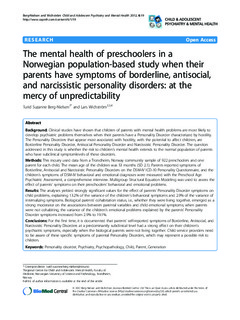The mental health of preschoolers in a Norwegian population-based study when their parents have symptoms of borderline, antisocial, and narcissitic personality disorders: at the mercy of unpredictability
Journal article, Peer reviewed
Permanent lenke
http://hdl.handle.net/11250/2353226Utgivelsesdato
2012Metadata
Vis full innførselSamlinger
- Institutt for psykologi [3143]
- Publikasjoner fra CRIStin - NTNU [38518]
Sammendrag
Background: Clinical studies have shown that children of parents with mental health problems are most likely to develop psychiatric problems themselves when their parents have a Personality Disorder characterized by hostility. The Personality Disorders that appear most associated with hostility, with the potential to affect children, are Borderline Personality Disorder, Antisocial Personality Disorder and Narcissistic Personality Disorder. The question addressed in this study is whether the risk to children’s mental health extends to the normal population of parents who have subclinical symptomlevels of these disorders.
Methods: This inquiry used data from a Trondheim, Norway community sample of 922 preschoolers and one parent for each child. The mean age of the children was 53 months (SD 2.1). Parents reported symptoms of Borderline, Antisocial and Narcissistic Personality Disorders on the DSM-IV ICD-10 Personality Questionnaire, and the children’s symptoms of DSM-IV behavioral and emotional diagnoses were measured with the Preschool Age Psychiatric Assessment, a comprehensive interview. Multigroup Structural Equation Modeling was used to assess the effect of parents’ symptoms on their preschoolers’ behavioral and emotional problems.
Results: The analyses yielded strongly significant values for the effect of parents’ Personality Disorder symptoms on child problems, explaining 13.2% of the variance of the children’s behavioral symptoms and 2.9% of the variance of internalizing symptoms. Biological parents’ cohabitation status, i.e., whether they were living together, emerged as a strong moderator on the associations between parental variables and child emotional symptoms; when parents were not cohabiting, the variance of the children’s emotional problems explained by the parents’ Personality Disorder symptoms increased from 2.9% to 19.1%.
Conclusions: For the first time, it is documented that parents’ self-reported symptoms of Borderline, Antisocial, and Narcissistic Personality Disorders at a predominantly subclinical level had a strong effect on their children’s psychiatric symptoms, especially when the biological parents were not living together. Child service providers need to be aware of these specific symptoms of parental Personality Disorders, which may represent a possible risk to children.
